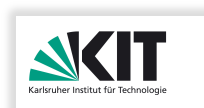| [stroessner21ma] | Tina Maria Strößner, Bounding Information Leakage by Combining an Interpreter with Model Counting, August 2021.
|
Zusammenfassung
Information flow control (IFC) is the process of analyzing whether an attacker can
gain information about sensitive data by observing the outputs of a program. The
traditional approach to IFC is qualitative. The focus is on whether the program leaks
any information. More relevant for practical purposes is the quantitative approach to
IFC, where the aim is to measure how much information the program can leak.
Quantitative approaches to IFC are usually classed into one of two categories. Static
analyses and dynamic analyses. We present an approach to quantitative information
flow control that combines both. Our tool performs a SAT-based analysis of the program,
that converts all information flows into propositional formulas. We combine this with
a static quantitative IFC tool that is applied to parts of the program, where analyzing
every program path is infeasible.
We show that the combination of the two approaches can improve the results of the
quantitative analysis, compared to purely static or purely dynamic tools.
Download
BibTeX
Institutsinterne Autoren
Bachelor- und Masterarbeiten

